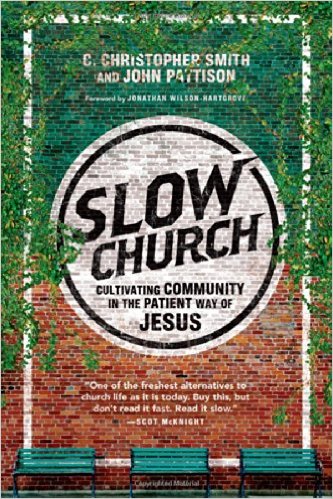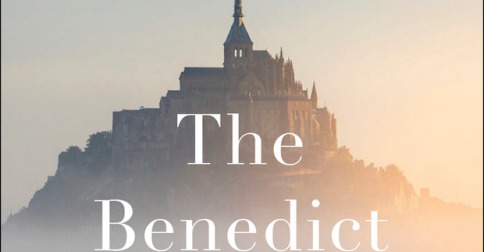John pointed out to me recently that Greg Wolfe, editor of IMAGE, gave a passing tip o’ the hat to Slow Church in his latest editorial for the journal:
[When] you edit a literary quarterly you often encounter people who advise you to give up on such an outmoded and burdensome enterprise: why publish long stories and essays and poems that no one will read in the age of Twitter and blockbuster movies? There are even those far less jaded and more gracious souls who applaud me for publishing such a “scholarly” journal.
Whether cynical or sweet, the implication is that what you will find in these pages is difficult. In part, this stems from a populist strain in our cultural history that sees fine art and literature as elitist and exclusivist. In reply, you can point out innumerable examples of great artists who came from poverty and no education on the one hand, and on the other the ways that art can inspire and liberate the disadvantaged, but it’s an uphill fight.
But the problem isn’t just the stubborn persistence of a know-nothing populism. It’s that for many people the very leisure and contemplation that art requires (and invites us to) are alien if not incomprehensible things.
There are countervailing forces and signs of hope out there. I’ve taken some comfort from the rise of the Slow Food movement and the other movements it has spawned, from Slow Travel to Slow Church.
You might recall that Slow Food was founded in Italy as a protest against the introduction of fast food to places like the Spanish Steps in Rome. What saved the Slow Food movement from being a mere publicity stunt—a mere celebration of long meals—was that it placed the way we eat in the context of sustainable agriculture and the conviction that good food emerges from the richness of diverse cultures. You might say that all real culture—from eating habits to artistic masterpieces—is slow. In a recent commencement address the writer Leon Wieseltier praised the tradition of the liberal arts, which were founded on leisure and contemplation. He told the graduates of Brandeis that the new “information era” came with dangerous consequences:
‘In the digital universe, knowledge is reduced to the status of information. Who will any longer remember that knowledge is to information as art is to kitsch—that information is the most inferior kind of knowledge, because it is the most external? A great Jewish thinker of the early Middle Ages wondered why God, if he wanted us to know the truth about everything, did not simply tell us the truth about everything. His wise answer was that if we were merely told what we need to know, we would not, strictly speaking, know it. Knowledge can be acquired only over time and only by method.’
Wieseltier concludes by saying: “Perhaps culture is now the counterculture.”
I was having a conversation recently with several folks here at Englewood Christian Church about how the breakdown of culture that we feel so intensely today (and that Wolfe names in his editorial) is nothing new, but rather the cumulative effects of the modern history of individualism and industrialization. Wolfe is certainly correct that there is a pointed need today for the recovery of culture. If I’m reading Wolfe correctly, what he is calling for here is the return to a Sabbath sort of life, marked by spaces of leisure and contemplation.
What John and I are calling Slow Church, is a vision for recovering culture that begins in the local church congregation, as we share life together and as we intentionally relearn habits that nurture culture and promote the health and flourishing of our congregations, neighborhoods, cities and the world. These habits include both Sabbath and work (as modern industrialization has been driven to a large extent by the desire to avoid work). We are hopeful that culture can be recovered, but of course, just as culture has broken down the 500+ years of modernity, likewise, we expect that the healing and restoration of culture will take at least as long and perhaps even longer.
Alisdair Macintyre speaks of the recovery of culture in a famous passage at the close of his classic work After Virtue. He concludes:
What matters at this stage [in history] is the construction of local forms of community within which civility and the intellectual and moral life can be sustained through the new dark ages which are already upon us. And if the tradition of the virtues was able to survive the horrors of the last dark ages, we are not entirely without grounds for hope. This time however the barbarians are not waiting beyond the frontiers; they have already been governing us for quite some time. And it is our lack of consciousness of this that constitutes part of our predicament. We are waiting not for a Godot, but for another — doubtless very different — St. Benedict.
Jonathan R. Wilson, has treated this passage from Macintyre at length in his superb book Living Faithfully in a Fragmented World, which imagines what such a new monasticism might look like. And indeed over the last decade, a new monastic movement has emerged that has many synergies with what we are calling Slow Church. Though many of these new monastic communities have experienced a great deal of instability — in the form of the exodus of members or the dissolution of their communities — they have demonstrated that there is way forward out of the ever-tightening grasp of barbaric powers of our time (corporations, political parties, etc.). Our vision for Slow Church is that local churches can become hubs for sustaining and nurturing “civility and the intellectual and moral life,” a form of new monasticism that is — to borrow terms from one of the archetypes of new monasticism, Shane Claiborne — more ordinary than radical. Yes, there are undoubtedly a host of theological and socio-economic challenges that must be worked through — exactly the sort of challenges that I suspect led many new monastics to reject, or at least be ambivalent toward, church life — but it is in naming and grappling with such painful and divisive issues that we will recover essential virtues including civility, patience and cooperation.
Just as there was both a continuity (with the tradition of the church) and a discontinuity (with the culture of Empire) in the emergence of Benedict and the Benedictines, so too our churches offer a fertile and hopeful soil for the cultivation of new forms of civility and culture, if we are able to repent of our conformity to the powers of empire, and be continually transformed together into the likeness of Christ.


![Why I Sold Back My Smartphone [Guest Post -Jonathan Melton]](http://slowchurch.com/wp-content/uploads/2017/08/Iphone.jpg)

![Book Giveaway – Reading For the Common Good [3 copies]](http://slowchurch.com/wp-content/uploads/2017/05/RFTCG-Cover-Banner.jpg)





Leave a Reply